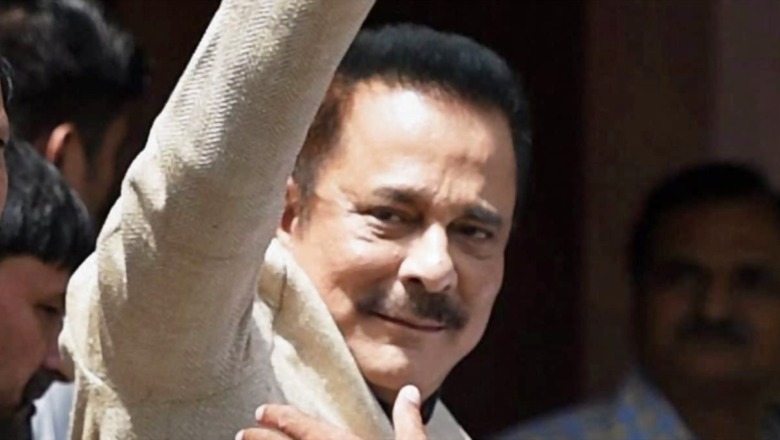
views
Creating an empire from nothing is a task that goes down in history with long remembrance. Subrata Roy is exactly known for it. When he was earning Rs 1,500 per month in 1978 at the age of 30, he never thought his fortune would grow into billions of dollars and his company would become one of the largest in the country.
Born in Bihar’s Araria in 1948, Roy started his journey as a businessman in 1976 when he joined the chit fund company Sahara Finance. After two years, he later took over the control of the company and revamped its financial model in 1978, inspired by the older Peerless Group.
The Businesses
In the 1990s decade, Roy shifted to Lucknow, which became the base of the Sahara group that once grew into India’s largest group. He studied at Holy Child Institute in Kolkata and later did mechanical engineering at Government Technical Institute, Gorakhpur, where he started his first business.
Starting on a modest scale with a capital of only Rs 2,000, the group later grew into India’s major conglomerate and diversified into various sectors, including financial services, media, real estate, education, entertainment, hospitality, tourism, and healthcare.
He operated a vast number of businesses such as Aamby Valley City, Sahara Movie Studios, Air Sahara, Uttar Pradesh Wizards, and Filmy, among others.
He ventured into media in 1992 by setting up the Hindi-language newspaper Rashtriya Sahara. He also established electronic media channel Sahara TV, which was later in 2000 renamed as Sahara One.
In 2004, Sahara was the second-largest employer in India only after Indian Railways and became one of the largest conglomerates in the country. Till 2014, he had a business empire worth more than Rs 1.5 lakh crore.
The Sahara Group chief went on to own landmark global properties, including London’s iconic Grosvenor House (he purchased in 2010) and New York’s Plaza Hotel (which Roy bought in 2012).
Known to have friends among the famous and powerful across the fields of politics and Bollywood, Sahara also sponsored the Indian cricket and hockey teams and owned a Formula One racing team.
The weddings of his two sons some two decades ago are still among the biggest parties ever seen in India. He lived in Lucknow.
Sahara ventured into education with a digital education platform Edunguru. Subrata Roy in June 2019 also announced his foray into the automobile sector under the brand name ‘Sahara Evols’. The Sahara Evols venture will offer a wide range of electric vehicles (EVs) along with advanced allied services.
Sahara has a workforce of about 1.2 million including salaried employees, consultants, field workers, and agents, among others. According to Sahara India Pariwar’s website, “The most fair value of our assets is worth Rs 2,59,900 crore.”
The Troubles
Subrata Roy’s troubles started in November 2010 when stock market regulator Sebi asked two entities of Sahara Group not to mobilise funds from equity markets or from issuance of any security to the public while restraining Roy from approaching the public for raising money.
Roy was arrested in 2014 on the orders of the Supreme Court after he failed to appear before it in a contempt case arising out of non-refund of more than Rs 20,000 crore to investors by two of his companies.
He was later granted bail but troubles continued for his various businesses.
Two Sahara Group companies — Sahara India Real Estate Corporation (SIRECA) and Sahara Housing Investment Corporation — raised funds in 2007-08 through a debenture instrument OFCD.
Later in June 2011, the regulator asked the two group entities to refund money collected from investors through Optionally Fully Convertible Debentures (OFCD) along with the return.
After a long process of appeals and cross-appeals, the Supreme Court had ordered in 2012 refund of deposits of its investors along with 15 per cent interest.
Sahara was eventually asked to deposit an estimated Rs 24,000 crore with Sebi for further refund to investors, though the group always maintained it amounted to “double payment” as it had already refunded more than 95 per cent of investors directly.
Once asked for proof of repayment, Roy famously sent across 100 truckloads of documents to Sebi, triggering a unique warehousing crisis for the regulator.
In another incident, a man from Gwalior threw ink on Roy’s face and called him a thief when he was brought to the Supreme Court in his trademark waistcoat and tie amid chaotic scenes.
The Sahara Group had earlier said it has always built its businesses by productively channelizing human capital spread across India and giving employment and work at people’s doorstep.
Subrata Roy on November 14, 2023, died due to a cardiorespiratory arrest at a private hospital in Mumbai on Tuesday after a prolonged illness at the age of 75, after a long battle with complications arising from metastatic malignancy, hypertension and diabetes.
(With Inputs From Agencies)




















Comments
0 comment